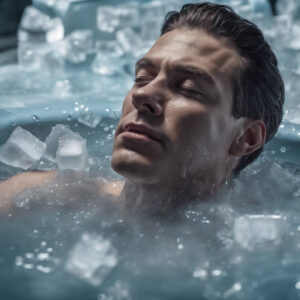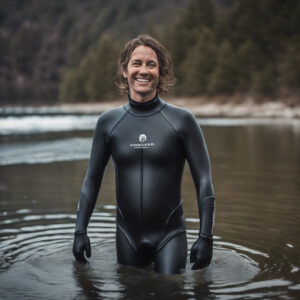What do Novak Djokovic, Cristiano Ronaldo, Lady Gaga, Madonna, Anthony Joshua, and Tony Robbins have in common besides success and resilience? Cold exposure is their thing.
The finest thing is following their example. It’s affordable without an A-lister’s salary. Cold exposure keeps most individuals fit, healthy, young, and resilient at an affordable cost.
The Influence of Wim Hof
After mentioning these stars, Wim Hof must be mentioned. No one has done more to popularise cold exposure and breathing practices than this Dutchman. After his wife’s untimely death, he coped with sadness with breathing and intense cold. His famous status has spurred greater studies into how this intense exercise may improve our mental and physical health, vitality, energy, strength, and resilience.
The Mind-Body Connection
When you enter a cold shower, your entire body screams to leave. This is a classic “fight, flight, or freeze” reaction. The cold reminds us that we control our responses. You can leap out of the shower and run away from what the body perceives as a danger or calm the mind by taking deep, slow, steady breaths and working through the discomfort. Staying under the chilly water teaches your mind to keep calm under pressure. This is Wim Hof’s teaching base.
Building Mental Resilience
Furthermore, you are enhancing your mental fortitude, which will prove invaluable in various other areas of your life. If you can maintain your composure while taking a cold shower or ice bath, you can apply the same techniques to stay calm when facing other obstacles in your life. Cold exposure might be worth a shot if you’re looking to challenge yourself and step outside of your comfort zone. It can push you both emotionally and physically.
Defining Resilience
What is the true definition of “resilience”? Resilient individuals are often characterised as those who have faced adversity and emerged even stronger. However, resilience extends beyond simply conquering challenges or, in this instance, frigid weather conditions. It’s also about being flexible and excelling. Resilient individuals can effectively handle stress and maintain a positive outlook, even in challenging or unfavourable circumstances.
 How to boost resilience in cold water
How to boost resilience in cold water
When immersed in frigid water, the body strives to maintain a stable internal temperature. One of the ways it achieves this is by creating a thermal layer of water around your body. This layer is a protective barrier, shielding your body from the frigid water and minimising heat loss. When you start feeling chilly, it’s only natural to want to stay active to stay warm. If you’re in cold water and start moving your limbs, the thermal layer will break up, even though it works fine out of water.
When you move, you will feel the full intensity of the water’s chill. It is important to ensure your hands and feet remain in the water. Disrupting the thermal layer surrounding your body results in exposure to a lower temperature than remaining stationary. This method and developing resistance to the cold temperature can help enhance your resilience.
The role of norepinephrine and resilience
When considering our resilience, we often focus on our mental well-being. Research has demonstrated that exposing yourself to cold showers or ice baths can positively impact your mental well-being and ability to bounce back from challenges. This is because of your body’s physiological response to the cold temperature. One method it employs is increasing the production of norepinephrine, also called noradrenaline. Norepinephrine serves various roles in the body, acting as both a hormone and a neurotransmitter. When the cold weather sets in, an increase in norepinephrine production can positively impact our mental well-being. This is because it enhances our ability to concentrate, uplifts our mood, and sharpens our attention. Cold showers and cold water swimming have been found to potentially reduce symptoms of depression and attention deficit hyperactivity disorder, as they may be associated with lower levels of norepinephrine.
When we indulge in a refreshing cold shower, the incredible power of norepinephrine comes into play, acting as a hormone that gracefully orchestrates vasoconstriction. This narrowing of your blood vessels aids in retaining heat within your body. It performs this function to safeguard and maintain the warmth of your essential organs. After showering, your body heats up, and the veins and arteries expand. With regular occurrences, your body becomes accustomed to the reactions and sensations that come with it. By incorporating cold showers into your routine, you can gradually acclimatise your body to the cold and learn to manage the associated stress. Therefore boosting your resilience and vitality.
Resilience can also be seen as maintaining strength and good health, safeguarding oneself from illnesses and diseases, often triggered by inflammation. Norepinephrine can effectively reduce inflammation by inhibiting the production of cytokines. Cytokines are small proteins that can trigger inflammation. TNF-alpha is a cytokine that plays a crucial role in developing numerous diseases. Some of the conditions covered are cancer and diabetes. In the following sections, we will explore additional ways in which exposure to the cold can protect against the development of these debilitating diseases.
The role of cold exposure in boosting health resilience
As we’ve previously explored, cold exposure can potentially decrease inflammation effectively. Regularly incorporating cold showers into your routine can reduce the risk of developing diabetes. Exposure to freezing temperatures can improve glucose tolerance and lower blood sugar levels. This occurs because cold temperatures promote the rapid removal of glucose from the bloodstream. This phenomenon occurs due to the impact of freezing temperatures on a specific type of transporter protein known as GLUT 4 transporters. As a result of this effect, these proteins relocate to the cell walls, enabling them to function optimally. These transporters serve as crucial gateways, allowing glucose to exit the bloodstream and enter the cells, where it is utilised as essential energy for sustaining life.
Maintaining proper blood sugar levels is crucial for enhancing our body’s resilience against diabetes, obesity, and kidney disease. High blood sugar levels can result in nerve damage and potential vision loss. It is crucial to emphasise that in addition to enhancing resilience through cold exposure, maintaining a healthy diet and engaging in regular exercise are also of utmost importance.
Cold exposure, resilience, and sleep
You’re feeling overwhelmed by your inability to fall asleep, which is causing you more stress. It’s a common scene that unfolds in bedrooms every night all around the globe. Getting sufficient sleep is crucial for enhancing resilience and effectively managing stress. While excessive stress can disrupt sleep patterns, prioritising sleep can significantly improve your ability to cope with stress and bounce back the following day.
While in slumber, your brain diligently processes the day’s events, creating and storing new memories. Sleeping well is crucial for optimal brain function, enabling you to absorb new knowledge and process information more efficiently. Additionally, it empowers you to have better command over your emotional reactions and the capacity to make deliberate, well-thought-out choices the following day. Ensuring you get sufficient, rejuvenating sleep each night is crucial for your overall well-being and ability to bounce back.
Cold exposure and getting a good night’s sleep

I’m curious to understand the connection between cold temperatures and their impact on sleep quality and resilience. Can you shed some light on this? Research has demonstrated that spending time in relaxed environments can enhance slow-wave sleep. During this state of deep sleep, our minds store these memories permanently. During this time, the body undergoes a remarkable self-repair, healing, and detoxification process. It efficiently eliminates toxins and waste products generated by the hormones and enzymes utilised throughout the day. Exposure to cold temperatures can also stimulate the synthesis of melatonin.
Melatonin is commonly known as the “sleep hormone” because it aids in our relaxation and winding down in the evening, making it easier to fall asleep. A cold shower a few hours before your bedtime can effectively boost melatonin production. Avoid the temptation of indulging in a cold shower right before going to bed. Taking a cold shower in the morning can be an invigorating experience, leaving you feeling refreshed, energised, and ready to tackle the day ahead.
Reduce stress and improve resilience using cold exposure.
Modern Comforts and Thermal Stability
 Our ability to withstand extreme temperatures results from our evolutionary adaptation to living in caves. Regrettably, in terms of fostering resilience, we find ourselves enclosed within the confines of centrally heated, double-glazed houses. We all feel pretty cosy and comfortable. One possible explanation for our susceptibility to anxiety and depression is the absence of challenges to our thermal stability. It’s nearly a situation of either utilising it or forfeiting it.
Our ability to withstand extreme temperatures results from our evolutionary adaptation to living in caves. Regrettably, in terms of fostering resilience, we find ourselves enclosed within the confines of centrally heated, double-glazed houses. We all feel pretty cosy and comfortable. One possible explanation for our susceptibility to anxiety and depression is the absence of challenges to our thermal stability. It’s nearly a situation of either utilising it or forfeiting it.
Cold Exposure and Mental Health
Engaging in activities such as taking a cold shower, immersing oneself in an ice bath, or swimming in cold open water can stimulate the transmission of electrical impulses from the nerve endings in the skin to the brain. These electrical impulses enhance brain function, promoting heightened alertness, clarity, and energy levels. During this process, the body releases endorphins and dopamine, known as “happiness hormones.” These products have a significant impact on combating the adverse effects of stress, anxiety, and depression. Studies have indicated that incorporating a regular cold shower routine into your daily life can have significant benefits for managing stress, depression, and anxiety. It is recommended to take a cold shower for two to three minutes twice a day over an extended period of time.
Stress Reduction and Improved Sleep
As previously stated, falling asleep becomes more challenging when experiencing stress. Reducing stress through cold showers or immersing oneself in cold water is crucial for enhancing overall resilience and promoting restorative sleep.
Breathing Techniques and Cold Exposure
Stepping into a cold shower or bath often triggers an automatic gasp and rapid, shallow breathing. This breathing pattern and physiology mirror those experienced during moments of anxiety. It is crucial to remember to take deep, deliberate breaths when entering a cold shower. When the cold water hits your body, hunching your shoulders and tensing up all your muscles involuntarily can be tempting. Focus and determination will be key to overcoming this challenge. By practising mindful breathing, consciously releasing tension in your shoulders, and allowing your body to relax, you can effectively manage the stress caused by the cold temperature.
Through consistent practice, as you incorporate a daily cold shower into your routine, you can apply this practical approach to conquer feelings of anxiety that may arise in your daily experiences. As your body becomes accustomed to cold stress, it can also become better equipped to handle other types of stress. Enhance your mental resilience with this. If you can easily handle cold temperatures, you’ll also find it easier to manage stress and anxiety.
Focusing on the Present
Showering in extremely cold water can be quite a challenge. As the cold water hits you, it becomes difficult to think about anything else. Your primary focus becomes breathing and staying relaxed despite the intense cold.
How cold exposure makes your immune system more resilient
As previously stated, our homes have efficient central heating, ensuring a cosy and warm environment. This situation is far from ideal when considering health and resilience. A common misconception is that feeling cold automatically leads to catching colds and flu. During cold weather, it is common for people to seek refuge in their homes, adjusting the heating and ensuring all doors and windows are tightly closed. The warm environment creates ideal conditions for bacteria and viruses to flourish, increasing our susceptibility to illness. Not only does the cold eliminate these pesky bugs, but it also enhances our immune system. As a result, we have a higher ability to combat infections. We prefer to remain indoors, enjoying the comfort and warmth.
Cold Exposure and Immune Cell Activation
When we take a cold shower or immerse ourselves in an ice bath, various reactions within our body can impact our immune cells. One notable change is the increase in white blood cells, which is crucial in combating diseases. This occurs because when the body attempts to maintain its warmth, our metabolism accelerates, activating the immune system and generating white blood cells. Typically, the immune system is activated in response to the presence of bacteria or viruses that initiate an infection.
The body naturally releases a large number of white blood cells to eliminate harmful microbes. A recent study conducted in 2023 discovered that subjecting the body to extremely cold temperatures, like immersing oneself in an ice bath, can stimulate the production of natural killer cells. This is excellent news for the immune system, as natural killer cells can eliminate viruses and cancerous cells.
 Benefits of Cold Water Swimming
Benefits of Cold Water Swimming
Consider dipping in chilly outdoor waters if you want to elevate your experience beyond a mere cold shower. Consistently practising this can significantly enhance the strength of your immune system. Regular swimmers in cold water experience a significant increase in their white blood cell count compared to individuals who do not engage in this activity or only do it sporadically. In particular, the swimmers who frequented the pool regularly exhibited higher levels of monocytes and leukocytes.
Role of Monocytes and T-Lymphocytes
Monocytes play a crucial role in our immune system, tirelessly tracking down and eliminating harmful bacteria and viruses. After transforming, they morph into macrophages and proceed to devour infectious microbes. When T-lymphocytes encounter a particular strain of bacteria or virus, they quickly identify it as foreign to the body. They create substances known as antibodies. When the body reencounters the same bacteria or virus, the antibodies can quickly identify and respond to it, allowing it to eliminate them much more efficiently.
This phenomenon is commonly referred to as immunity. To maintain a robust immune system, it is essential to have a healthy balance of monocytes, T-lymphocytes, and natural killer cells. These cells play a crucial role in safeguarding our health and well-being. Regularly exposing the body to cold water multiple times a week for at least six weeks can effectively stimulate the production and function of immune cells that provide protection. Additionally, it activates B-lymphocytes and other immune cells, including interleukin-6. This further enhances the resilience of the immune system.
Oxidative Stress and Antioxidant Production
The body undergoes many chemical reactions with the countless metabolic processes constantly at work. These encompass digestion and energy production. Regrettably, these processes give rise to waste products known as free radicals, which can potentially harm our cells if they accumulate. This type of damage is known as oxidative stress and has the potential to cause inflammation, which can subsequently result in a variety of debilitating diseases. Free radicals accelerate the ageing process of our cells and tissues. Hence, the significance of antioxidants cannot be overstated regarding our well-being, energy, and ability to bounce back. These products combat the negative impact of oxidative stress on the body.
Glutathione and Hormesis
In addition to the antioxidants in our diet, our body also produces them as part of our natural immune system. Glutathione is one of the antioxidants that our body naturally produces. Regularly swimming in ice-cold water has been found to boost levels of this crucial antioxidant. This production of glutathione exemplifies hormesis. Hormesis is a fascinating phenomenon where the body’s response to stress leads to fortifying or toughening specific areas. It is worth noting that exposure to cold temperatures can also enhance resilience through this mechanism.
It’s important to note that cold water swimming can also lead to oxidative stress. Over time, the body naturally develops its antioxidants, which help counteract the effects of this process when it occurs regularly.
Cold Exposure and the Lymphatic System
Cold exposure also contributes to our battle against illness and disease and enhances our immune system by activating the lymphatic system. Like blood, lymph depends on the body’s movement to circulate throughout the system. The lymphatic system plays a crucial role in eliminating waste from the body, including toxins and bacteria. When the lymph is stagnant and not flowing through the body, it hinders the proper elimination of waste. Stagnation can result in infection, illness, and disease. A remarkable phenomenon occurs when you engage in the invigorating practice of immersing yourself in an ice bath or indulging in a refreshing cold shower. The lymph vessels, ever dutiful in their role, gracefully contract, facilitating the efficient circulation of lymph throughout your body. The waste products are efficiently eliminated by being flushed away through the lymph nodes and into the bloodstream. The white blood cells swiftly spring into action, removing the bacteria.
Cold exposure, the brain, and resilience
Exposure to cold temperatures, whether in water or chilly air, can protect against diseases, particularly those associated with the brain. Mistakes are bound to happen from time to time. The processes occurring in the body every day are incredibly complex. Proteins play a multitude of vital roles within the body. To perform these functions accurately, they are interconnected in chains. The chains of proteins exactly align themselves.
Improper arrangement or disorganisation can have serious consequences, including inflammation and the development of diseases like cancer, Alzheimer’s, and Parkinson’s. The arrangement of these protein chains is exact. Improper arrangement of these proteins can result in premature ageing by causing DNA damage. Exposure to cold temperatures can trigger the activity of specific proteins known as cold shock proteins. These remarkable cold shock proteins can locate and mitigate the detrimental impact of misfolded proteins.
Benefits of Cold Showers and Outdoor Swimming
Research has demonstrated that incorporating a daily cold shower into your routine can effectively decrease the sick leave you must take from work. In addition, regular swimmers who swim outdoors in cold water may experience an increase in their antioxidant levels. It protects against oxidative stress. Cold water immersion can be particularly beneficial for individuals with lung conditions, as it can help improve their breathing efficiency. The freezing temperature stimulates the activation of interleukins and lymphocytes, contributing to this phenomenon. Exposure to cold temperatures can contribute to a gradual decrease in both systolic and diastolic blood pressure.
Conclusion: Health Benefits of Cold Exposure
The evidence presented in this article highlights the numerous health benefits associated with exposure to cold. These products cater to both your physical and mental well-being. Indulge in a refreshing five-minute cold shower. Experience the refreshing sensation of submerging yourself in an ice bath. Alternatively, you could opt for a refreshing swim in the great outdoors. These can be used as a proactive approach to enhance your immune system. In addition, it has the potential to alleviate symptoms of pre-existing conditions like hypertension, insomnia, and anxiety. Embrace the thrill of diving into the refreshing cold water with the confidence of a seasoned professional.
The Article: Cold Exposure – Human Resilience and Rediscovering Your Vitality Appeared First On https://janestevensnutrition.com
The Article: Human Resilience and Vitality After Cold Exposure appeared first on https://janestevens.net
The Article Human Resilience and Vitality After Cold Exposure Was Found On https://limitsofstrategy.com
The Article Human Resilience and Vitality After Cold Exposure First Appeared ON
: https://ad4sc.com



Comments are closed